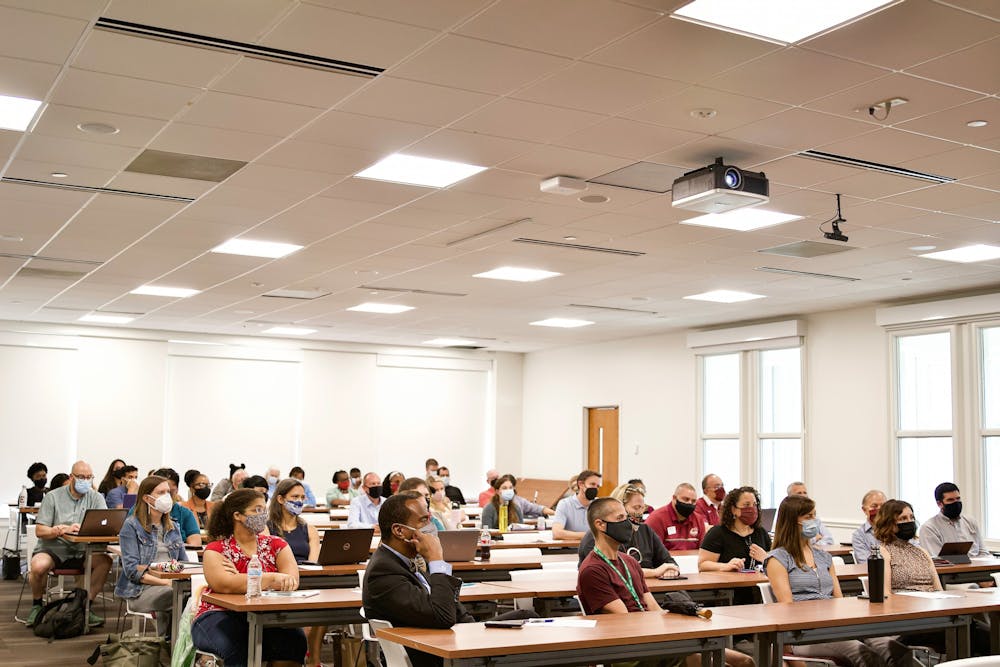Buffie Longmire-Avital, director of the Black Lumen Project, conducts research about the experiences of Black students, faculty and higher education. Her studies about encounters Black students and faculty face daily with discrimination, microaggressions and racism sparked her interest in diving deeper into conversations about racial equity on college campuses such as Elon.
The Black Lumen Project aims to provide programming, procedures and policy changes related to racial equity at the university, including an annual report which helps to present transparency about the university’s past history. The equity initiative will impact all members of the Elon community, but its main focus will center around the experiences of Black students, faculty, staff and alumni, according to Longmire-Avital.

Buffie Longmire-Avital, director of the Black Lumen Project, conducts research about the experiences of Black students, faculty and higher education.
“We are focused on and creating structure that is sustainable, that really centers on the Black experience on campus in ways that it’s intersected with the larger community as a whole,” Longmire-Avital said.
President of the Black Student Union Christina Carr said she is hopeful that the Black Lumen Project will allow the university administration to be more transparent, build a stronger relationships with student organizations and bring more awareness to the experiences Black students face at Elon.
“It’s important because everyone’s voice matters. I think that the experience, like I said before, the experience of Black students is going to look a lot different from the white students that go here,” Carr said. “I think that being transparent and honest about what that looks like for students, I think it allows Elon to kind of like open their eyes to who they are, who they’ve been and how to correct those things from the past.”
Longmire-Avital was appointed as director of the Black Lumen Project by Randy Williams, vice president and associate provost for inclusive excellence. Williams said his role within the Black Lumen Project is to support Longmire- Avital’s work on the initiative and that she was “a clear front-runner for the position.”
Prior to serving as director of the Black Lumen Project, Longmire-Avital was the coordinator of the African and African American Studies interdisciplinary minor and a member of the Boldly Elon planning committee. Longmire-Avital said her former position allowed her to explore how to bring more awareness and conversations surrounding the university’s history.
“Through that position, I was witness to so much wonderful work really from the ground up being done,” Longmire- Avital said. “When we saw an opportunity to really think about our histories, our institution’s history, it just seemed natural that we start there.”
The Black Lumen Project originated as a subcommittee of Elon’s participation in Universities Studying Slavery, an international consortium of colleges and universities that seek to address both historical and contemporary issues related to race and inequality in higher education.
Longmire-Avital said confronting the university’s past will help to uncover stories that bring to light racial inequality and push forward toward equity.
“It is again that focus on redrawing those lines that have been erased, finding those stories and creating a mechanism to house those stories and then a way to disseminate,” Longmire-Avital said.
Priorities of the Black Lumen Project include building relationships, establishing connections, uncovering untold stories, continuing initiatives in phase one and establishing cross-institutional engagement among the university and regionally. The development of relationships will be a critical component of the equity initiative, according to Williams.
Longmire-Avital said she is hopeful these priorities represent a commitment of sustainability toward racial equity within the university and that the efforts will be community-driven.
“This involves deep commitment. That action is not just one glorious kind of firework display of engagement and that’s it,” Longmire-Avital said. “This is really about creating a light and sustaining that light, and so that is what is most important to me.”


